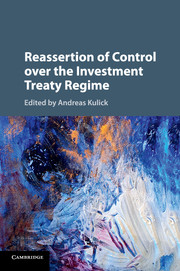Book contents
- Frontmatter
- Contents
- List of Contributors
- Preface
- PART I Introduction, Theory and Domestic Law Approaches
- PART II Procedural Aspects and Avenues of Reassertion
- PART III Substantive Aspects and Avenues of Reassertion
- PART IV Reassertion of Control: Policy and Trends
- 12 States' Reassertion of Control over International Investment Law: (Re)Defining ‘Fair and Equitable Treatment’ and ‘Indirect Expropriation’
- 13 How the European Commission and the EU Member States are Reasserting Their Control over Their Investment Treaties and ISDS Rules
- 14 Arbitrator Selection: Towards Greater State Control
- 15 Arbitrator (Issue) Challenge:What's the Real Issue?
- Index
15 - Arbitrator (Issue) Challenge:What's the Real Issue?
from PART IV - Reassertion of Control: Policy and Trends
Published online by Cambridge University Press: 12 January 2017
- Frontmatter
- Contents
- List of Contributors
- Preface
- PART I Introduction, Theory and Domestic Law Approaches
- PART II Procedural Aspects and Avenues of Reassertion
- PART III Substantive Aspects and Avenues of Reassertion
- PART IV Reassertion of Control: Policy and Trends
- 12 States' Reassertion of Control over International Investment Law: (Re)Defining ‘Fair and Equitable Treatment’ and ‘Indirect Expropriation’
- 13 How the European Commission and the EU Member States are Reasserting Their Control over Their Investment Treaties and ISDS Rules
- 14 Arbitrator Selection: Towards Greater State Control
- 15 Arbitrator (Issue) Challenge:What's the Real Issue?
- Index
Summary
Just another room, just another town, same old crazy people hanging around.
A. How Arbitrator Challenges Contribute to Current Criticism of Investment Dispute Settlement
International investment law truly has experienced an enormous boost in the twenty-first century. Likewise, its investor-State dispute settlement mechanism has been frequently used during this time by economic players advised by global law firms. Surprisingly, this area of law has been treated with indifference by the public until recently. This has changed drastically. After being a ‘sleeping beauty’ for decades – well known to its admirers but unnoticed by its opponents – international investment law and investor-State dispute settlement (ISDS) stepped into the centre of public attention mainly in connection with the Transatlantic Trade and Investment Partnership (TTIP), an envisaged comprehensive free trade agreement (FTA) between the United States and the European Union. Negotiations of FTAs such as TTIP, but also the EU-Canada Comprehensive Economic and Trade Agreement (CETA) and the Trans-Pacific Partnership Agreement (TPP), have initiated a heated public and academic debate on the legitimacy and the raison d’être of this system with its ISDS mechanism. The degree of criticism has varied from concerns regarding its democratic legitimacy and its necessity to accusations of it being a money-making machine for a small circle of financial beneficiaries and of it being a shadow justice (Schattenjustiz), a ‘cartel’ or even the ‘mafia’.
In such circumstances, the growing number of (partly successful) bias challenges has contributed to recent criticism by exacerbating mistrust in private investment dispute settlement. Trust in the independence and impartiality of decision makers, however, is a major prerequisite for the continuing viability of investment arbitration. Recent proposals for disqualification under the ICSID Convention were based on grounds of so-called issue conflict or issue challenges. In such an issue challenge, an arbitrator appears inappropriately predisposed to the subject matter in dispute or to one of the parties and thereby raises doubts as to his or her ability to approach the dispute with an open mind. The phenomenon of issue challenges has acutely heated up the discussion on the lack of transparency in ISDS and has aggravated the current legitimacy crisis of international investment law. Against this background, the topic of arbitrator issue challenge merits a closer analysis.
- Type
- Chapter
- Information
- Reassertion of Control over the Investment Treaty Regime , pp. 356 - 381Publisher: Cambridge University PressPrint publication year: 2016



